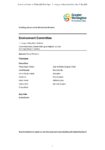Changes to Regional Predator Control Programme set to achieve greater environmental and economic outcomes
Changes to Greater Wellington’s predator control programme will achieve greater environmental outcomes and better value for money, the environment committee heard today.
Previously known as the Regional Possum Predator Control Programme, the Regional Predator Control Programme (RPCP) delivers the Regional Pest Managment Plan with a focus on protecting areas of high biodiversity and reducing impacts on the agricultural sector.
Wairarapa councillor Adrienne Staples says the change in delivery will make a difference at both the regional and local level.
“Areas of high biodiversity also mean high predator numbers, with the rich environment and abundance of food, and many of the areas that need protecting are in the Wairarapa,” says Cr Staples.
“We know our community is concerned with the growing possum numbers in South Wairarapa, and changes to the programme means resources can shift to focus predator control where it’s needed most.”
Cr Staples says predator control in areas of high biodiversity has already proven successful. An extensive trapping network around Wairarapa Moana has enabled threatened species like the matuku-hūrepo (Australasian bittern) to thrive, and ongoing trapping along Transmission Gully is preventing ferrets from reaching Wellington.
“Changes to the Regional Predator Control Programme is a realignment to the council’s priorities, protecting our natural environment and delivering value for ratepayers.”
Changes to the RPCP include shifting the focus from North Wairarapa to other areas across the region, including South Wairarapa, areas around Lake Wairarapa, and the Kāpiti foothills.
Principal advisor ecosystems, Henk Louw, says the changes will make the programme more collaborative and effective.
“Our approach will focus predator control in areas that provide the greatest benefit to our region, both environmentally and economically,” says Louw.
“Previous possum control work followed on from OSPRI operations, but as the threat of bovine tuberculosis has reduced, it’s time now for us to pivot to ensure our work effectively addresses increasing predator numbers.”
Greater Wellington monitoring shows possum numbers in privately owned native forests are nearly six times higher than public native forests, and the RPCP will aim to work with property owners to remove possums and other predators from their land.
“Predators pay little attention to property boundaries and our efforts should follow suit, working collaboratively to limit their impact on biodiversity and the agricultural sector to improve economic outcomes for landowners.”
The scope of the programme includes feral cats, mustelids, and other predator species, with changes to the RPCP set to take effect in July this year.
For more information, view the 15 May committee order paper:
Environment Committee 15 May 2025 Order Paper

Environment Committee 15 May 2025 Order Paper Read more here

date_range Published 09 May 2025
Download now (PDF 15 MB) get_appGet in touch
- Phone:
- 0800 496 734
- Email:
- info@gw.govt.nz
